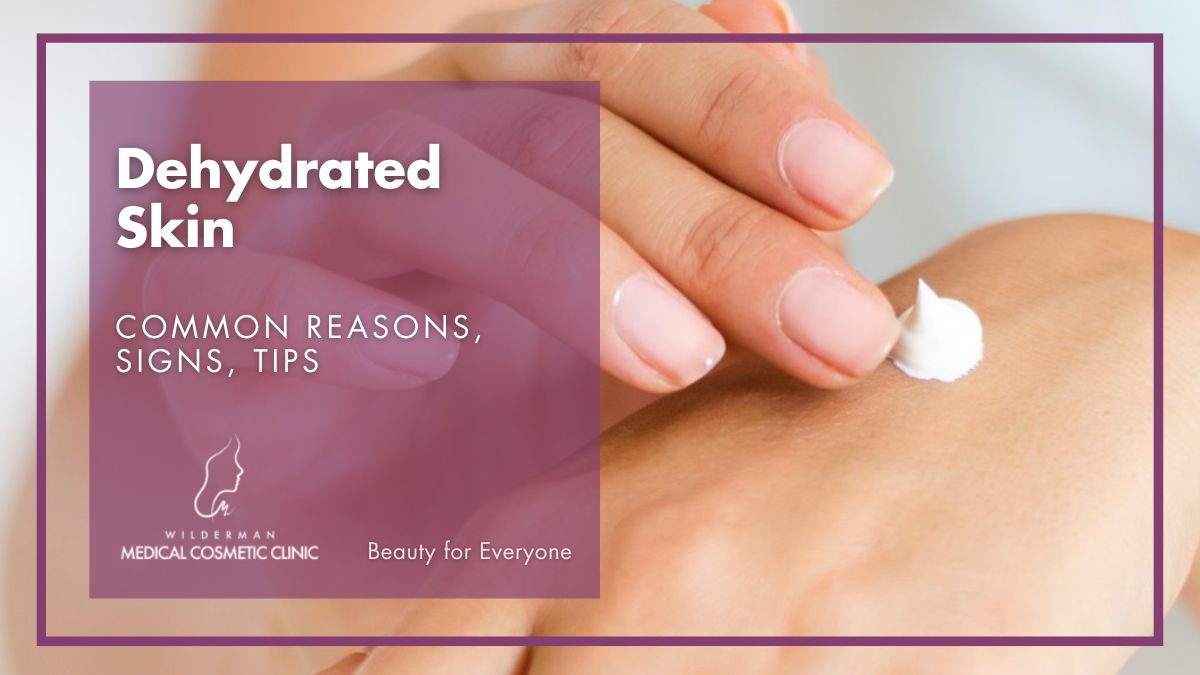Dehydrated Skin
Common Reasons, Signs, Tips
Maintaining healthy and radiant skin requires proper hydration.
However, many individuals struggle with dehydrated skin, which can lead to discomfort, dullness, and a compromised skin barrier.
Why is my skin dehydrated?
There are several factors that can contribute to skin dehydration.

Get immediate answers about possible treatment options tailored for you, expected results, and much more.
- Expert Diagnosis
- Customized Treatment Plans
- No Obligation
- Comfort and Privacy
- Immediate Answers
Understanding these causes can help you identify and address the underlying issues leading to your dehydrated skin.
Here are some common reasons why your skin may be dehydrated:
- Environmental factors: Exposure to harsh environmental conditions can strip moisture from your skin. Dry air, low humidity levels, and extreme temperatures can all contribute to dehydration. Additionally, spending prolonged periods in air-conditioned or heated environments can further dehydrate your skin.
- Inadequate hydration: Your skin’s hydration levels are closely linked to your body’s overall hydration. If you don’t drink enough water or consume excessive amounts of dehydrating substances like caffeine or alcohol, your skin may suffer. It’s important to maintain a balanced and adequate intake of water to keep your skin hydrated.
- Harsh skincare products: Some skincare products contain ingredients that can disrupt the skin’s moisture balance. Cleansers, toners, and exfoliants that contain alcohol, sulfates, or fragrances can strip away natural oils and moisture from your skin, leaving it dehydrated.
- Aging: As we age, our skin undergoes natural changes that affect its ability to retain moisture. The production of sebum, the skin’s natural oil, decreases over time, leading to a loss of moisture and hydration. This can result in drier, more dehydrated skin.
- Medications and health conditions: Certain medications, such as diuretics or acne treatments, can cause dehydration as a side effect. Additionally, certain health conditions, like diabetes or eczema, can disrupt the skin’s moisture balance and contribute to dehydration.
- Excessive cleansing: Over-washing your face or using harsh cleansers can strip away the skin’s natural oils and moisture. This can disrupt the skin barrier and lead to dehydration. It’s important to find a balance in your cleansing routine and choose gentle, hydrating products.
- Diet and nutrition: A poor diet lacking essential nutrients can impact the health and hydration of your skin. Nutrients like vitamins A, C, and E, and essential fatty acids play a role in maintaining skin hydration. Eating a balanced diet rich in fruits, vegetables, and healthy fats can help support your skin’s hydration.
How can you tell if your skin is dehydrated?
Identifying whether your skin is dehydrated is crucial in order to provide it with the appropriate care and hydration it needs. A simple pinch test can help you determine if your skin is dehydrated.
Pinch a small area of your cheek and release it. If you observe wrinkles and the skin doesn’t bounce back quickly, it may indicate dehydration.
Here are some common signs that can help you determine if your skin is dehydrated:
- Tightness and discomfort: Dehydrated skin often feels tight, especially after cleansing or exposure to environmental factors. If your skin feels taut or uncomfortable, it may be a sign of dehydration.
- Dull and lackluster appearance: Dehydrated skin can appear dull, lackluster, and lacking in vitality. It may lose its natural glow and look tired or lifeless.
- Increased sensitivity: Dehydration can make your skin more sensitive and reactive. You may experience increased redness, irritation, or stinging sensations when applying skincare products or coming into contact with certain substances.
- Rough or uneven texture: When your skin lacks hydration, it can feel rough or have an uneven texture. You may notice more prominent dry patches or flakiness, particularly on the cheeks, forehead, or around the mouth.
- Fine lines and wrinkles: Dehydrated skin can accentuate the appearance of fine lines and wrinkles. When the skin lacks moisture, these lines become more visible, especially in areas prone to wrinkles, such as around the eyes and mouth.
- Oiliness and breakouts: Paradoxically, dehydrated skin can sometimes produce excess oil as a compensatory mechanism. If your skin feels oily or if you’re experiencing more breakouts than usual, it could be a sign of dehydration.
- Slow skin recovery: Dehydrated skin may take longer to recover from external stressors or skin issues. It may exhibit a delayed healing process, making it more difficult for the skin to bounce back from breakouts, inflammation, or environmental damage.
It is important to note that these signs may vary depending on individual skin types and conditions.
If you suspect your skin is dehydrated, consider consulting your family doctor, dermatologist, or skincare professional for a more accurate assessment and personalized advice.
Dehydrated skin vs. dry skin
Understanding the differences between dehydrated skin and dry skin is essential for implementing the right skincare regimen. While these terms are often used interchangeably, they refer to distinct conditions that require different approaches for effective treatment. Here’s a breakdown of dehydrated skin versus dry skin:
Dehydrated Skin:
- Lack of moisture: Dehydrated skin lacks water or hydration. It may feel tight, itchy, or uncomfortable.
- Temporary condition: Dehydration is often caused by external factors, such as environmental conditions, lifestyle habits, or skincare choices. With proper hydration and care, dehydrated skin can be restored to a healthier state.
- Oiliness or breakouts: Dehydrated skin can produce excess oil as a compensatory mechanism. This can lead to oiliness, shine, or increased breakouts.
- Dullness and fine lines: Dehydration can result in a dull and lackluster complexion. It may also accentuate the appearance of fine lines and wrinkles due to the lack of moisture support.
Dry Skin:
- Lack of oil: Dry skin lacks oil or sebum production, which impairs the skin’s ability to retain moisture. It often feels rough, flaky, or scaly.
- Long-term condition: Dry skin is typically genetic or influenced by factors like age or hormonal changes. It requires ongoing attention and a regular skincare routine to maintain optimal hydration.
- Sensitivity and irritation: Dry skin tends to be more sensitive and prone to irritation. It can cause redness, itching, or a tight sensation.
- Fine texture and premature aging: Dry skin often has a fine texture and may be more prone to early signs of aging, such as fine lines, wrinkles, and loss of elasticity.
While dehydrated skin and dry skin share some overlapping symptoms, it’s important to note the underlying causes and choose appropriate treatments accordingly.
Dehydrated skin requires immediate hydration and can often be improved with lifestyle adjustments and topical hydration. Dry skin, on the other hand, necessitates long-term moisturization and nourishment to maintain a balanced and healthy skin barrier.
How to treat dehydrated skin
Treating dehydrated skin involves replenishing and restoring moisture to the skin cells. By adopting a consistent skincare routine and making certain lifestyle adjustments, you can effectively improve the hydration levels of your skin.
Here are some tips to help treat dehydrated skin:
Hydrating skincare routine:
- Cleanse with a gentle, hydrating cleanser that doesn’t strip the skin of its natural oils.
- Use a hydrating toner to balance the skin’s pH levels and prepare it for better absorption of subsequent products.
- Apply a lightweight, moisturizing serum or essence containing hydrating ingredients like hyaluronic acid or glycerin.
- Follow up with a moisturizer that provides long-lasting hydration. Look for products that contain emollients and occlusives to lock in moisture.
Regular hydration:
- Drink an adequate amount of water throughout the day to hydrate your body from within. Aim for at least eight glasses of water daily. Adjust your water intake according to environmental conditions and activity level — warmer temperatures and increased activity increase your body’s hydration needs.
- Include water-rich foods in your diet, such as fruits and vegetables, to boost hydration.
Humidifier usage:
- In dry environments, use a humidifier to add moisture to the air. This helps prevent excessive water loss from your skin.
Protect from environmental factors:
- Shield your skin from harsh weather conditions by wearing protective clothing, including hats and scarves, and using sunscreen with a high SPF.
- Limit your exposure to extreme temperatures, as they can exacerbate dehydration.
Avoid harsh products:
- Stay away from skincare products that contain alcohol, fragrances, or harsh chemicals, as they can further dehydrate the skin. Opt for gentle, hydrating formulations instead.
Facial masks and treatments:
- Incorporate hydrating facial masks into your routine, applying them once or twice a week to provide an extra boost of moisture.
- Consider using facial oils or nourishing masks with ingredients like aloe vera or ceramides to help repair and hydrate the skin.
Protect the skin barrier:
- Strengthen the skin’s natural moisture barrier by using a moisturizer with ingredients like ceramides or niacinamide.
- Avoid over-exfoliating or using harsh scrubs, as they can compromise the skin barrier and worsen dehydration.
Lifestyle adjustments:
- Limit your intake of dehydrating substances like caffeine and alcohol, as they can contribute to skin dehydration.
- Quit smoking, as smoking can worsen skin dehydration and compromise overall skin health.
- Incorporate regular exercise into your routine, as exercise increases blood flow, carrying nourishing substances to the skin cells and removing waste products, thereby increasing the vitality of the skin.
- Eat a diet rich in a wide variety of colorful fruits and vegetables, whole grains, and lean proteins to provide your skin with the nutrients it requires.
- Maintain good sleep hygiene to allow your body adequate time to rest and repair.
Remember, consistency is key when treating dehydrated skin. It may take time for your skin to regain its optimal hydration levels, so be patient and diligent with your skincare routine.
If your skin concerns persist or worsen, consider consulting your doctor or a dermatologist for further evaluation and personalized recommendations.
Conclusion
Dehydrated skin can be distressing, but with the right understanding and care, it can be effectively treated and managed.
By identifying the causes of dehydration, recognizing its symptoms, and implementing appropriate skincare practices, you can restore your skin’s moisture balance, resulting in a healthier, more radiant complexion.
Remember to prioritize hydration, both internally and externally, for long-lasting skin health and vitality.
Reference
Coconut Soul. (October 20, 2022). Dry and Dehydrated Skin: Understanding the Difference and Tips for Care. Retrieved from https://mycocosoul.com/blogs/skin-care-regimen/dry-and-dehydrated-skin (Accessed June 15, 2023).
Healthline. (May 2, 2018). Dehydrated Skin: Symptoms, Causes, and Treatments. Retrieved from https://www.healthline.com/health/dehydrated-skin#test (Accessed June 15, 2023).
Medical News Today. (January 27, 2021). Dehydrated skin: Causes, symptoms, and treatments. Retrieved from https://www.medicalnewstoday.com/articles/dehydrated-skin#contacting-a-doctor (Accessed AccessedJune 15, 2023).
Related content that may be of interest
Sun Damage – Signs, Causes, Treatment. Sunshine is undoubtedly delightful, but prolonged exposure to the sun’s harmful ultraviolet (UV) rays can take a toll on our skin. Sun damage, also known as photoaging, is a common concern that affects millions of people worldwide

